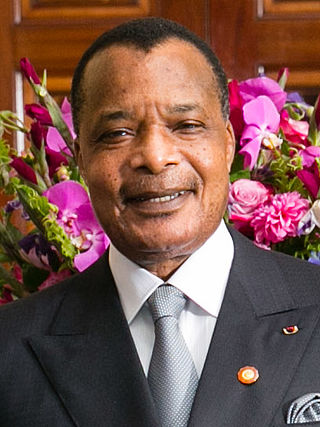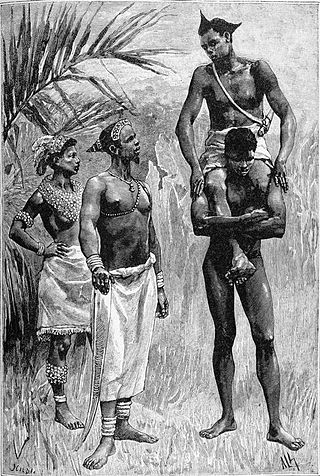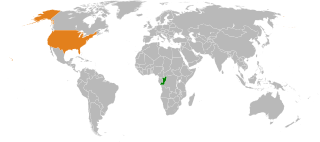| |||||
| Decades: | |||||
|---|---|---|---|---|---|
The following lists events that happened during 1890 in the Congo Free State .
| |||||
| Decades: | |||||
|---|---|---|---|---|---|
The following lists events that happened during 1890 in the Congo Free State .
| Date | Event |
|---|---|
| Camille Coquilhat takes office as vice governor-general | |
| Lusambo is chosen by Paul Le Marinel as the main Belgian base in the Kasaï region to defend against the threat of Arab or Swahili traders in slaves and ivory who were encroaching from the east. [1] | |
| September | The Compagnie du Congo pour le Commerce et l'Industrie (CCCI) sends an expeditionary force named the Compagnie du Katanga under Alexandre Delcommune to Katanga. [2] |

The history of the Republic of the Congo has been marked by diverse civilisations: Indigenous, French and post-independence.

French Equatorial Africa was a federation of French colonial territories in Equatorial Africa which consisted of Gabon, French Congo, Ubangi-Shari, and Chad. It existed from 1910 to 1958 and its administration was based in Brazzaville.

Denis Sassou Nguesso is a Congolese politician and former military officer. He has served as president of the Republic of the Congo since 1997. He served a previous term as president from 1979 to 1992. During his first period as president, he headed the Congolese Party of Labour (PCT) for 12 years. He introduced multiparty politics in 1990, but was stripped of executive powers by the 1991 National Conference, remaining in office as a ceremonial head of state. He stood as a candidate in the 1992 presidential election but placed third.

The Congo Free State, also known as the Independent State of the Congo, was a large state and absolute monarchy in Central Africa from 1885 to 1908. It was privately owned by King Leopold II, the constitutional monarch of the Kingdom of Belgium. In legal terms, the two separate nations were in a "personal union". The Congo Free State was not a part of, nor did it belong to Belgium. Leopold was able to seize the region by convincing other European states at the Berlin Conference on Africa that he was involved in humanitarian and philanthropic work and would not tax trade. Via the International Association of the Congo, he was able to lay claim to most of the Congo Basin. On 29 May 1885, after the closure of the Berlin Conference, the king announced that he planned to name his possessions "the Congo Free State", an appellation which was not yet used at the Berlin Conference and which officially replaced "International Association of the Congo" on 1 August 1885. The Free State was privately controlled by Leopold from Brussels; he never went there.

Moïse Kapenda Tshombe was a Congolese businessman and politician. He served as the president of the secessionist State of Katanga from 1960 to 1963 and as prime minister of the Democratic Republic of the Congo from 1964 to 1965.

AbbéFulbert Youlou was a laicized Brazzaville-Congolese Roman Catholic priest, nationalist leader and politician, who became the first President of the Republic of the Congo on its independence.
DEMIAP was the military intelligence organization of the Democratic Republic of the Congo. According to Belgian official sources in 2002, it falls under the authority, 'at least officially', of the chief of staff of Congolese Armed Forces, now succeeded by the FARDC. it was divided in two departements:

André-Philippe Futa was a politician in the Democratic Republic of the Congo. He was originally from Miabi in Tshilenge District.

The People's Republic of the Congo was a Marxist–Leninist socialist state that existed in the Republic of the Congo from 1969 to 1992.

André Ntsatouabantou Milongo was a Congolese politician who served as Prime Minister of the Republic of the Congo from June 1991 to August 1992. He was chosen by the 1991 National Conference to lead the country during its transition to multiparty elections, which were held in 1992. He was also the founder and President of the Union for Democracy and the Republic (UDR-Mwinda), a political party. From 1993 to 1997, he was President of the National Assembly, and he was again a deputy in the National Assembly from 2002 to 2007.

The Lunda are a Bantu ethnic group that originated in what is now the Democratic Republic of the Congo along the Kalanyi River and formed the Kingdom of Lunda in the 17th century under their ruler, Mwata Yamvo or Mwaant Yav, with their capital at Musumba. From there they spread widely through Katanga and into Eastern Angola, north-western Zambia and the Luapula valley of Zambia.

Republic of the Congo–United States relations are the international relations between the Republic of the Congo and the United States of America.
This is a survey of the postage stamps and postal history of the Democratic Republic of the Congo, formerly Zaire and the Belgian Congo.
Victor Nendaka Bika was a Congolese politician from the Democratic Republic of Congo. He was the second Director of the Congo's national security police and intelligence agency, the Sûreté Nationale. Nendaka died on 22 August 2002 while in exile in Brussels.

Alexandre Delcommune was a Belgian officer of the armed Force Publique of the Congo Free State who undertook extensive explorations of the country during the early colonial period of the Congo Free State. He explored many of the navigable waterways of the Congo Basin, and led a major expedition to Katanga between 1890 and 1893.

Albert Ndele Bamu was a Congolese politician and banker. He served as chairman of the College of Commissioners-General that governed the Republic of the Congo (Léopoldville) for two weeks while Justin Marie Bomboko returned from New York to Léopoldville, and the next four months as deputy chairman. He was later governor of the National Bank of the Congo from 1961 to 1970. He briefly served as the Minister of Finance. One term from September 1960 to February 1961, and another term from 15 September 1970 until his dismissal on 12 November 1970.
The following is a timeline of the history of the city of Lubumbashi, Democratic Republic of the Congo.

List of Ministers of Finance of Democratic Republic of the Congo since the independence of Republic of Congo:

The Compagnie du Congo pour le Commerce et l’Industrie (CCCI) was a private enterprise in the Congo Free State, later the Belgian Congo and then the Democratic Republic of the Congo, whose subsidiaries engaged in a wide range of activities in the Congo between 1887 and 1971. These included railway and river transport, mining, agriculture, banking, trading and so on. It was the largest commercial enterprise in the Congo for many years. It went through various mergers in the years that followed before its successor Finoutremer was liquidated in 2000.

Kamatanda is a region just north of Likasi in the Haut-Katanga Province of the Democratic Republic of the Congo. It gives its name to an open-pit copper mine, a railway junction, an abandoned airport and a residential area of Likasi.